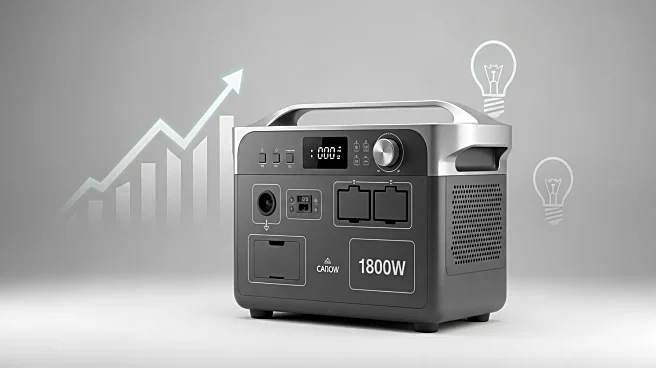What's Happening?
EcoFlow has reduced the price of its Delta 2 portable power station on Amazon, offering it at $429, down from $699. This power station provides 1024Wh of backup power, capable of running essential household appliances during power outages. The unit features 15 outlets, including AC plugs, USB-A, USB-C ports, and a car charging port, allowing multiple devices to be powered simultaneously. The Delta 2 can achieve 80% charge in 50 minutes and full charge in 80 minutes, significantly faster than comparable units. It uses LiFePO4 battery technology, supporting over 3000 charge cycles, making it a durable option for long-term use. The power station can also be recharged using solar panels, making it suitable for off-grid scenarios.
Why It's Important?
The discount on the EcoFlow Delta 2 power station comes at a time when electricity bills are rising due to factors like tariffs and inflation. This portable power solution offers consumers a reliable backup during outages, potentially reducing dependency on the grid and mitigating the impact of increasing utility costs. The fast charging capability and solar panel compatibility make it a versatile option for emergency preparedness and sustainable energy use. As electricity demand grows, having a reliable backup power source becomes crucial for households, especially in areas prone to outages.
What's Next?
With the ongoing rise in electricity costs, consumers may increasingly turn to portable power solutions like the EcoFlow Delta 2. The trend towards sustainable and independent energy sources could drive further innovation and competition in the portable power market. As more households adopt such technologies, there may be a shift in consumer behavior towards energy independence, potentially influencing utility companies to reconsider pricing and service strategies.
Beyond the Headlines
The adoption of portable power stations like the EcoFlow Delta 2 highlights a broader shift towards energy resilience and sustainability. As consumers seek alternatives to traditional power sources, there may be increased interest in renewable energy solutions and technologies that offer independence from the grid. This shift could have long-term implications for energy policy and infrastructure development, encouraging investment in sustainable energy technologies.









